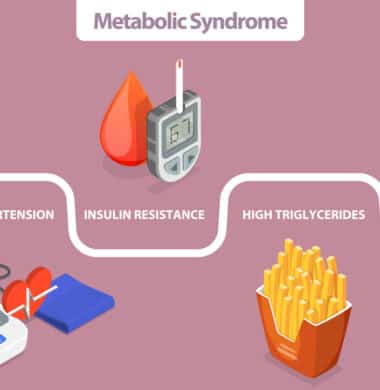What Is Metabolic Syndrome?

Metabolic syndrome refers to a group of five risk factors that contribute to heart disease, stroke and diabetes. Approximately 20% of Americans have metabolic syndrome and this figure rises with age, as over 45% of individuals over the age of 60 have this condition.
To be diagnosed with metabolic syndrome, you must have three or more of the five risk factors associated with the condition:
- High blood sugar levels
- High blood pressure
- Excess body fat around the waist
- High levels of triglycerides in the blood
- Low levels of HDL (“good”) cholesterol in the blood
While each of these can increase your risk of cardiovascular health issues, the risk of serious problems significantly rises when they are combined. Metabolic syndrome can result in an accumulation of plaque in your arteries, causing them to become clogged. When this occurs, blood clots may form which may trigger a heart attack or stroke.
What Are the Causes of Metabolic Syndrome?
Since metabolic syndrome consists of a collection of risk factors, there are a variety of potential causes. These may include:
- Insulin resistance – Insulin is a hormone produced to help your body process glucose (sugar) so that it can be used as fuel. Individuals with insulin resistance aren’t able to use insulin efficiently, causing their blood sugar levels to rise. This often results in the development of diabetes.
- Obesity – In particular, obesity in the abdominal region (excess belly fat) will increase your risk of metabolic syndrome more than excess fat in other regions of the body.
- Unhealthy lifestyle – Eating a lot of processed foods and failing to get regular exercise may contribute to developing metabolic syndrome.
- Smoking – Smoking is a contributing factor in a variety of health conditions, including many of the risk factors associated with metabolic syndrome.
Common Risk Factors of Metabolic Syndrome
The following factors can increase your risk of developing metabolic syndrome:
- Age – Metabolic syndrome is more likely to develop as you get older. Individuals in their 40s have a 20% risk of getting metabolic syndrome, and this rises to 35% in your 50s and 45% once you are over the age of 60.
- Genetics – Individuals with a parent or other first-degree relative with diabetes are at greater risk of metabolic syndrome.
- Ethnicity – Individuals of Hispanic and Southeast Asian descent typically have a higher risk of developing metabolic syndrome.
- Prone to blood clots and inflammation – Both of these conditions are commonly found in individuals with metabolic syndrome.
- Other medical conditions – Conditions such as fatty liver disease, polycystic ovary syndrome (PCOS), lipodystrophy and cholesterol gallstones increase your risk of metabolic syndrome.
What Are the Symptoms of Metabolic Syndrome?
In general, there are no visible symptoms for most of the five risk factors that comprise metabolic syndrome (other than extra belly fat). Therefore, the best way to determine whether you have metabolic syndrome is to go for your annual checkup with your doctor. During this visit, your doctor will check your blood pressure, blood sugar and cholesterol to determine if you have metabolic syndrome.
You’ll be diagnosed with metabolic syndrome if you have three or more of the following metrics:
- Waistline of 40 inches or more for men and 35 inches or more for women
- Fasting blood glucose level above 100 mg/dl
- Blood pressure above 130/85 mm Hg
- Triglyceride level above 150 mg/dl
- High density lipoprotein level (HDL) under 40 mg/dl for men or under 50 mg/dl for women
Preventing and/or Treating Metabolic Syndrome
In most instances, you can prevent metabolic syndrome or manage the condition by making a series of lifestyle changes that involve adopting healthy habits. These include:
- Eat a healthy diet – Adopting healthier eating habits can lower your blood pressure and cholesterol and improve insulin resistance. Eat a diet that is high in fruits, vegetables, low fat dairy, beans, lean protein and whole grains. In addition, limit your consumption of foods high in saturated fat, trans fat, salt and cholesterol. A good way to ensure you’re eating the right foods to prevent metabolic syndrome is to adopt the Mediterranean diet.
- Exercise – Exercise is an effective way to lower blood pressure, manage cholesterol levels and improve insulin resistance. Ideally, you should get at least 150 minutes of aerobic exercise every week.
- Lose weight – Hopefully the adjustments to your diet and exercise regimen will also help you shed some excess pounds. If you’re obese or have extra fat in the abdominal region, weight loss will be a critical way to prevent or manage metabolic syndrome.
- Quit smoking – This will pay dividends in just about every aspect of your health.
If these lifestyle changes aren’t sufficient to treat your metabolic syndrome, you may need one or more of the following medications to help reduce your numbers for these risk factors to normal levels:
- Diabetes medications
- High blood pressure medications
- Cholesterol medications
- Low-dose aspirin (for individuals who are prone to blood clots)
South Denver Cardiology Associates Can Help You Manage Metabolic Syndrome
At South Denver Cardiology Associates, we offer a variety of services that can help you reduce your risk of developing and/or treat metabolic syndrome. Our comprehensive preventive cardiology clinic provides world-class diagnostic evaluation and treatments to help you prevent the development of a wide range of cardiovascular conditions, including metabolic syndrome. These services can help you alleviate symptoms, prevent major issues from developing and maximize your quality of life.
In addition, our team can help you make the lifestyle changes necessary to prevent or treat metabolic syndrome. Our weight loss clinic will help you establish healthy eating habits. You’ll work with board-certified cardiologists, nurse practitioners, registered dietitians and exercise physiologists who will provide nutritional consulting and help you create an individualized nutrition plan to take control of your health.
In addition, you can visit our medical fitness gym to establish an exercise program that is tailored to help you effectively manage any metabolic syndrome risk factors you exhibit. Our exercise specialists are all university trained and certified, and they will supervise all of your fitness activities to ensure you achieve the maximum benefit from your customized exercise program.
Contact us today to schedule an appointment at South Denver Cardiology Associates, serving the South Denver area and Littleton.
- 9 Tips to Reduce Holiday Stress - December 11, 2025
- 6 Tips for Exercising Outdoors with a Heart Condition - May 19, 2025
- Lifestyle Changes That Can Help Manage Arrhythmia - April 30, 2025
Sign Up
As with any health concerns, your specific treatment program should be discussed thoroughly with your primary care physician as well as any specialists who may need to be consulted – like a cardiologist.
Sign Up

